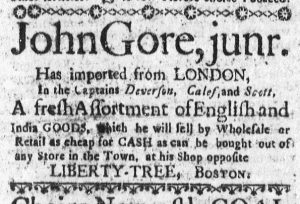What was advertised in a colonial American newspaper 250 years ago this week?

“At his Shop opposite LIBERTY-TREE, BOSTON.”
John Gore, Jr., sold a “fresh assortment of English and India GOODS … at his Shop opposite LIBERTY-TREE” in Boston in the late 1760s. By November 1767, Gore had been referencing the Liberty Tree in his advertisements for more than two years, a practice that he began during the Stamp Act crisis. Other advertisers had used the Liberty Tree as a landmark to direct consumers to their businesses while the Stamp Act was in effect, but Gore was the only shopkeeper in Boston who consistently invoked the Liberty Tree in his commercial notices after Parliament relented and repealed the Stamp Act. Doing so suggested his politics to potential customers. He asserted the appropriate relationship between England and the colonies even as he continued to import and sell English goods.
Making that pitch became more complicated in the fall of 1767. Colonists in Boston accused English merchants of draining the province of hard currency through an imbalance of trade. For several years colonists had imported more from Britain than they exported. Add to that the imposition of new legislation, the Townshend Acts, that assessed new taxes on certain imported goods, set to take effect on November 20, 1767. Residents of Boston determined that they needed to take action. At a town meeting on October 28, 1767, Bostonians pledged “to promote Industry, Oeconomy, and Manufactures, and by this Means prevent the unnecessary Importation of European Commodities, the excessive Use of which threatens the Country with Poverty and Ruin” (according to the report on the first page of the Massachusetts Gazette that carried Gore’s advertisement invoking the Liberty Tree). To that end, Bostonians “VOTED, That this Town will take all prudent and legal Measures to encourage the Produce and Manufactures of this Province.” Furthermore, they promised “that we will encourage the Use and Consumption of all Articles manufactured in any of the British Colonies.” To underscore their resolve, Bostonians voted to institute a new non-importation and non-consumption agreement effective on December 31. The Boston Evening-Post, the Boston-Gazette, and the Boston Post-Boy all carried this news on November 2. Similarly, the Massachusetts Gazette inserted it on November 5. The Boston Post-Boy called special attention to these measures with a rare headline: “Save your MONEY, and you Save your COUNTRY!”
Gore found himself in a difficult position. For the past two years he had used his shop’s proximity to the Liberty Tree to identify his business, encouraging patrons to associate his enterprise with resistance to Parliament’s attempts to unjustly tax the colonies. Now, however, his friends and neighbors called for an outright boycott of his imported merchandise. One of his primary appeals to prospective customers, familiar due to its steady repetition in the public prints, suddenly became much less powerful. Would it matter that Gore’s shop was located “opposite LIBERTY-TREE” if he stocked an array of goods imported from London?
